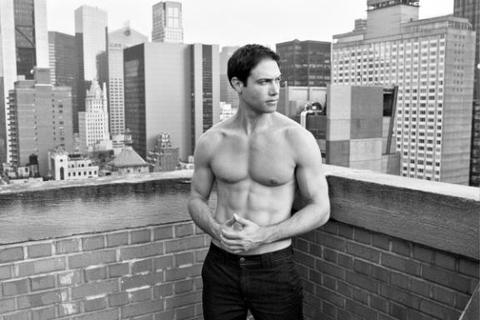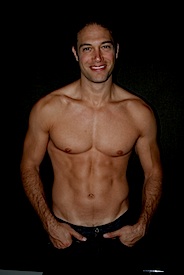Two photos define my relationship with exercise -- my own personal "Before" and "After" pictures. To a lot of people, they look pretty similar (my guy friends say they both look dumb ... oh, and my arms look skinny too), but to me they symbolize everything wrong with how I used to think about fitness.
When the first photo was taken, I believed that a workout wasn't successful unless I had suffered during and after exercising (limping the next day was a sign of achievement). My mistake was that I thought I looked in shape so what I was doing must have been correct. The reality was that I was literally running myself into the ground. The second shot is all about letting go of self-inflicted pain and experiencing the enjoyment of being healthy and active.

BEFORE
AFTER

My journey with exercise began as a passionate athlete who loved to compete. In the years after college I soon found myself an overscheduled adult with a young child straining to find the time to stay fit. It was a struggle where I was soon battling chronic physical injuries, which in turn, led to mental fatigue and even despair as a result of how poorly my body felt.
Eventually I found alternative means of exercise that respected my body, healed my injuries and led me to a healthy balance where I discovered that you really don't have to suffer in order to get back in shape. These days I try to maintain a positive mindset where I keep my sense of humor, avoid too many self-criticisms (after all that's what my buddies are for) and have a long-term perspective on wellness.
It's easier said then done but it is a path that ultimately leads not only to physical fitness, but mental well-being. What do the photos mean to me? They remind me that there are many means to an end. It isn't WHAT you do, it's HOW you do it -- and the most important part of anything you choose to do in life is to enjoy the ride.
Americans spend in the neighborhood of $40 billion a year on diet and exercise, and with six in ten adults overweight or obese it seems pretty clear that physical fitness is not what we are buying.
In many ways exercise has become like entertainment, or in the case of the Biggest Loser, actually IS entertainment. Much like the latest summer action movie or pop sensation, health has become part of pop culture, conceived with the help of focus groups and thoroughly contrived to be "easy on the eyes" and available in easy installments of "just" $19.95. Judging by the stats, something that the business of weight loss doesn't want you to know is that by and large, what they are selling doesn't seem to be working very well.
Exercise isn't just a matter of increasing your longevity either -- some science suggests (though we're not certain) that while there are countless ways for people to take years off our lives (cigarettes, fast food, living near high-tension electrical lines) there might not be much we can do in the way of exercise to add more then about three to five years to our life expectancy. Raw food diet you say? To each his own, but personally I would rather climb in the coffin right now. More provocatively, some new studies seem to suggest that people who can achieve long-term weight loss are the statistically anomalies as Time magazine pointed out.
There are clearly many health benefits to exercise, but how we think about fitness is seriously flawed, since for most people it seems (that as far as looks go) the body you are born with is your body (Yes ... except that time you broke your butt in the gym training for those wedding photos ... Yo-Yo weight gain is a drag, but yeah, you looked great). And this is exactly the point. We are being sold quick fixes that address our appearance, but not our long-term health and well-being.
Remember when exercise used to be fun? Pickup basketball, dodgeball and even a simple game of tag were pure bliss. I mean kids actually think jumping rope is fun. One of the biggest challenges facing adults is that the instinctive ease with which we first experience physical activity as kids becomes a rigorous and painful grind as we age. We go from the concept of exercise as recreation to the idea that is work (hence the name workout). The environment of sports and activity that we grow up with is radically different then our adult lifestyles permit (and our more fragile bodies can tolerate as we get older). Lets be honest: gym class in this country doesn't exactly prepare us to stay fit our whole lives (unlike in China where masses of people do Tai Chi in public parks and also ride their bicycles everywhere).
In many ways I was the victim of genes that predispose me to a leaner physique. My dad is a gym rat, but that doesn't explain his ability, at the age of 72, to still consume enough food to feed a high school football player and still look like a rider in the Tour Du France team (no joke -- he eats a loaf a bread every day in addition to his large meals). Since I "looked" fit I wasn't attuned to the fact that I was inflicting pain on myself. The same is true for people who are disposed to being bigger boned. Although they maybe doing everything right for their health, they fail to meet their own goals for how they think they should look. In they end, they either end up taking riskier, more aggressive steps to lose weight, or become disenchanted and simply give up on exercise all together (to the refrain of "oh this pointless").
The weight loss business pays lip service to "health benefits," but then focuses on the money shot of steel buns. The equation is simple: consume less calories then you burn and you will lose weight. This is easy in controlled environments like a prison camp or the military (slender physiques are abound in those situations). Unfortunately, when left to their own devices, people don't seem to be very good at maintaining the ideal balance between diet and exercise. Quantity of life may or may not improve from exercise, but I believe quality of life most certainly does (and that doesn't mean fitting into a pair of slim-fitting pants). Here are some general tips that have helped me stay healthy, I hope they work for you:
If you are going to exercise, make sure you ENJOY what you are doing -- if you don't, you will be miserable the whole time and you will never stick with it. Not everyone is built to be a runner. Maybe your calling is hiking, yoga, rock climbing, biking or even shoveling snow (ok that sucks, but you get the idea). Our bodies evolved doing sustained physical movement and an active lifestyle (of any sort) remains a cornerstone of our overall health. Our ancestors didn't really have a choice about whether or not to keep moving (those barbarian hordes were pretty good motivators). It was just part of their lifestyles, lets keep the tradition alive and make it part of ours.
Fad diets come and go and I have a basic problem with all of them. Most aren't a lifestyle that considers long-term health. Losing weight only to binge later makes absolutely no sense to
me. I remember my dad once looked up from his paper after reading about a new fad workout that consisted of controlled meals and calisthenics and deadpanned: "Yeah, they had that workout 50 years ago when I was growing up. It was called: Getting drafted..." There are countless ways to get in shape, and basically every means of human exertion has been tried before. Don't look for a new miracle breakthrough. The only thing to discover is the activity YOU enjoy and will stick with.
Happening Upon a Sword in a Stone
For me the light went on when I discovered non-impact exercises. My first spin class kicked my butt. I went for it because it was sort of like happening upon a sword in a stone in the middle of the woods. You glance around in both directions to see if anyone is looking ... and then you yank at that sucker to see if you can pull it out. Crippled from running though my injuries, I was convinced I could never "burn" as many calories as jogging. I was sorely mistaken and for me non-impact sports were equal parts epiphany and deliverance, because they won't cause injuries. It works for me, but the key is to find something you can do consistently and your whole life.
Stop the Suffering
If you view exercise as suffering, you aren't doing it right. People obsessed with cardio have some issues,and I don't think they will sweat it out on the elliptical. Find balance in your life and make sure you have fun. After years of pain I seem to have finally landed upon a place I am not only at my healthiest, I am at my happiest. I love to be active, but I also love to have a good hamburger and a beer.
Prehab
Most people jump headlong into new fitness regimes and invariably get injured. Rehab occurs after injuries occur. "Pre-hab" aims to prevent them from happening in the first place. If you are going to start a new sport, haven't played in years (or all winter), make sure you strengthen the muscles you will be using. Of course, it never hurts to take care of your knees and hamstrings.
Higher Resistance Does Not Equal a Better Workout
Tougher resistance and more pain DOES NOT mean a better workout. For many guys (me included), piling on the weight is our natural instinct and we genuinely believe it is a more effective exercise. Proper form is key and stressing muscles in a controlled movement is not only equally difficult, it is safer too. I can tell you in indoor cycling that being "out of the saddle" (standing up while peddling) with no resistance is much harder then having weight on the flywheel.
Olympic Gymnastics
Engage your core and focus on form: When people hear the word "core" they think abdominals and endless amounts of crunches. The reality is we drastically under-use our core strength and learning how to use it can be a bit tricky. Of all the groups of muscles in our body, your core has the ability to ease the impact and strain of exercise. No matter what your doing -- the elliptical machine, biking, hitting a golf ball, rock climbing or even walking up the stairs, engaging your core will drastically improve your performance and health. Once you discover how to use your core strength, your life will change forever.
Change it Up
You can get repetitive stress injuries from typing so it's no surprise that pounding the pavement every single day can lead to injures. Avoiding over-training of the same areas (working your "beach" muscles is the most common culprit) is not only a more effective way to exercise, it is a good strategy to avoid ibuprofen and ice packs.